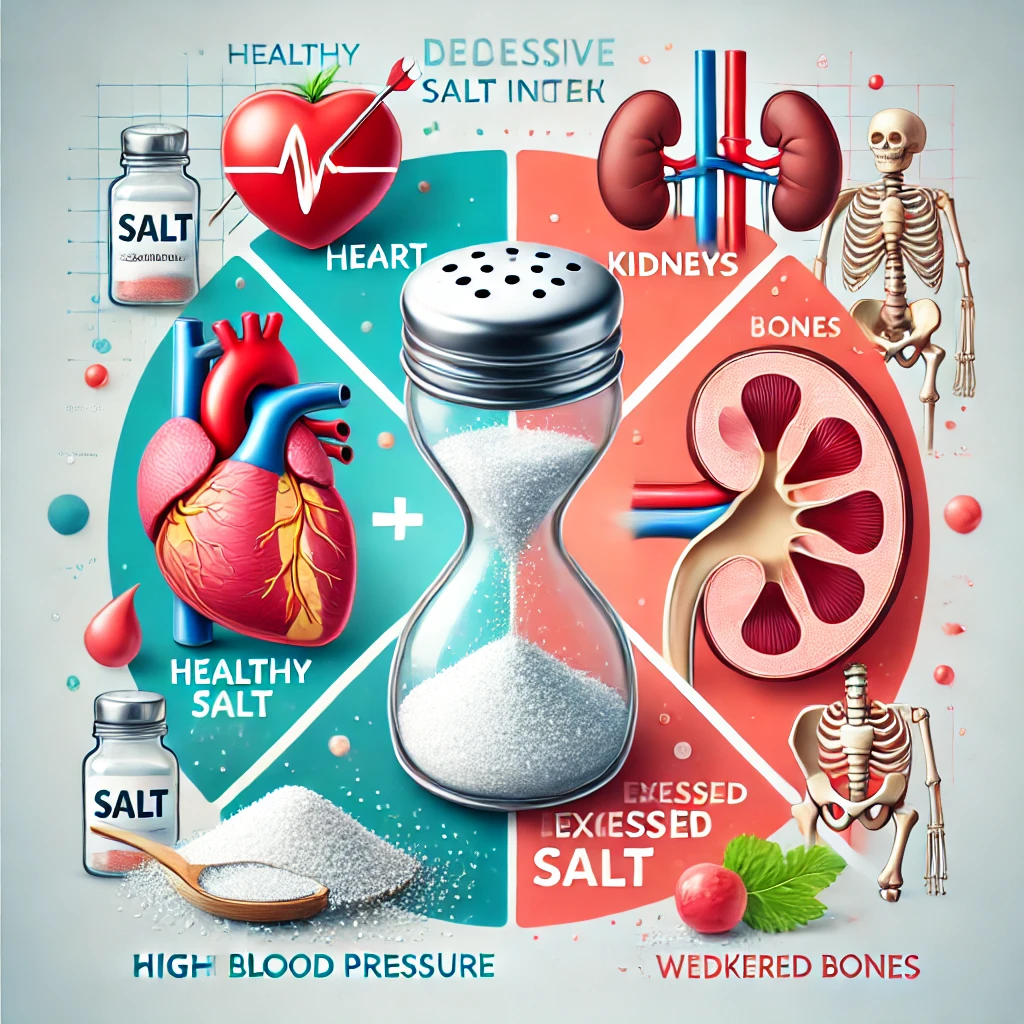Salt is an integral component of our diet, providing essential minerals like sodium for the body’s vitality. Salt is so important that most meals are, in fact incomplete without it. However, excessive consumption can have significant health consequences. Many individuals consume processed foods, which contain high levels of salt, making it easy to exceed the recommended daily intake. Today’s post discusses the effects of salt on your health. Let’s get to it!

Why is Salt Important to the Body?
Salt, mainly composed of sodium chloride, serves several important functions. These include:
- Regulating Fluid Balance: Sodium helps maintain the right amount of fluids inside and outside cells, preventing dehydration and excessive water retention.
- Supporting Nerve and Muscle Function: The body relies on sodium to transmit nerve signals and regulate muscle contractions, including those of the heart.
- Maintaining Blood Pressure: Sodium influences blood pressure by controlling the volume of blood in the circulatory system.
- Enhancing Nutrient Absorption: It aids in the absorption of essential nutrients like glucose and amino acids in the intestines.
As hinted earlier, while salt is an essential component of our diet, consuming too much can lead to a number of health issues, some of which can be devastating.
How Too Much Salt Affects Your Health
1. Increases Blood Pressure
Excessive salt intake can lead to high blood pressure (hypertension). When sodium levels in the blood are high, the body retains more water to dilute the excess salt. This increases blood volume, forcing the heart to work harder and putting strain on the arteries. Over time, this added pressure can lead to damaged arteries, increasing the risk of heart disease and stroke.
2. Increases the Risk of Heart Disease and Stroke
High blood pressure caused by excessive salt intake is one of the leading risk factors for cardiovascular diseases. Excess sodium thickens and stiffens artery walls, reducing blood flow to the heart and brain. This increases the likelihood of heart attacks, strokes, and heart failure. A diet high in salt also contributes to inflammation and oxidative stress, both of which can further damage the cardiovascular system.
3. Overburdens the Kidneys
The kidneys help regulate sodium levels by filtering excess salt out of the bloodstream through urine. However, when there is too much sodium in the diet, the kidneys struggle to maintain balance, leading to increased blood pressure and fluid retention. Over time, this strain can contribute to kidney disease, kidney stones, and even kidney failure. People with preexisting kidney conditions are particularly vulnerable to the negative effects of excessive salt consumption.
4. Weakens Bones and Increases Osteoporosis Risk
Too much salt can lead to calcium loss from the bones. When sodium levels in the blood are high, the body pulls calcium from bones to maintain balance, leading to decreased bone density over time. This increases the risk of osteoporosis, a condition that weakens bones and makes them more prone to fractures. Women, especially postmenopausal women, are at a higher risk due to hormonal changes that already contribute to bone loss.
5. Causes Water Retention and Bloating
Salt causes the body to retain water, leading to bloating, swelling (edema), and discomfort. This is especially noticeable in the hands, feet, and face. While temporary bloating is not necessarily dangerous, chronic water retention due to excessive salt intake can contribute to high blood pressure and increased strain on the heart and kidneys.
A Word from HealthFacts to You
Salt is essential but must be consumed in moderation. It is important to cut down on sodium intake to improve your heart health, kidney function, and bone strength while preventing chronic diseases. So what can you do?
- Cook more at home and eat fresh foods
- Read food labels and watch out for foods with high sodium content
- Use herbs and spices instead of salt
- Drink plenty of water.
These dietary changes can help reduce your salt intake and improve your overall health.
Kindly subscribe to our newsletter for more updates from us.









